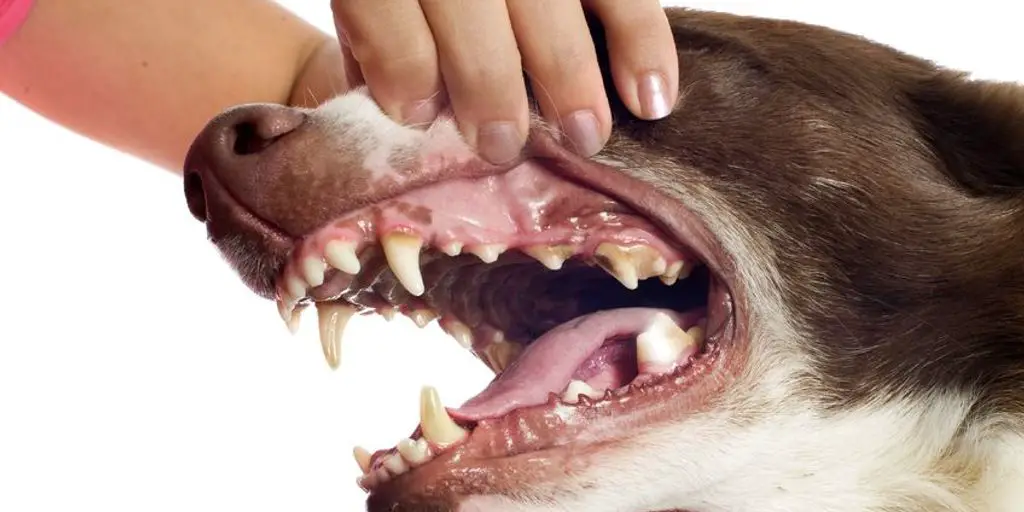Dog gum disease is a common yet often overlooked health issue that can lead to serious complications if not addressed. Just like humans, dogs require regular dental care to maintain their oral health. This article explores various natural remedies and preventive measures to help combat gum disease in dogs, ensuring they lead a happy and healthy life.
Key Takeaways
- Regular dental care is essential for preventing and managing gum disease in dogs.
- A balanced diet, including specific foods and supplements, can promote dental health.
- Natural remedies such as coconut oil, aloe vera gel, and herbal mouth rinses can be effective in treating gum disease.
- Homemade dog toothpaste recipes offer a natural alternative to commercial products.
- Regular vet check-ups are crucial for early detection and treatment of gum disease.
Understanding Dog Gum Disease

Gum disease in dogs, also known as canine periodontal disease, is a common yet often overlooked health issue. It starts with the accumulation of plaque and tartar on your dog’s teeth, leading to gum inflammation. If left untreated, it can progress to more severe stages, causing pain, bad breath, tooth loss, and even systemic health problems. Balanced diet essential for overall well-being.
The Role of Diet in Preventing Gum Disease
When it comes to your dog’s dental health, nutrition plays a crucial role. Just like in humans, what your dog eats can significantly impact their oral hygiene. Let’s dive into how diet can help prevent gum disease in dogs.
Daily Dental Care for Your Dog

Taking care of your dog’s teeth daily is crucial for their overall health. Just like us, dogs need regular dental care to prevent gum disease and other oral issues. Here are some tips to keep your pup’s mouth healthy and happy.
Natural Remedies to Combat Gum Disease
Coconut Oil for Gum Health
Coconut oil is a fantastic natural remedy for maintaining your dog’s gum health. Applying a small amount of coconut oil to your dog’s gums can help reduce inflammation and fight bacteria. It’s also safe for your dog to ingest, making it a win-win solution. Just make sure to consult your vet before starting any new treatment.
Aloe Vera Gel Application
Aloe vera gel is another excellent option for soothing your dog’s gums. Apply a small amount directly to the gums to help reduce inflammation and promote healing. Aloe vera is known for its anti-inflammatory properties, making it a great natural remedy for gum disease.
Herbal Mouth Rinses
Herbal mouth rinses can be a great addition to your dog’s dental care routine. Ingredients like chamomile and calendula can help reduce inflammation and fight bacteria. Simply brew a tea with these herbs, let it cool, and use it as a mouth rinse for your dog. Again, always consult your vet before trying new treatments.
Natural remedies can be a great way to support your dog’s dental health, but it’s always important to consult your vet before starting any new treatments.
Homemade Dog Toothpaste Recipes
Making your own dog toothpaste at home is not only easy but also budget-friendly. You can use simple ingredients that you likely already have in your kitchen. Here are three recipes to get you started.
Simple Baking Soda Paste
This basic recipe requires just two ingredients:
- 1 tablespoon of baking soda
- 1 tablespoon of water or broth
Mix these together to form a paste. Apply a small amount to your dog’s toothbrush and gently brush their teeth.
Coconut Oil and Turmeric Mix
For a more flavorful option, try this coconut-infused recipe:
- 1 tablespoon of baking soda
- 1 tablespoon of organic coconut oil
- A pinch of turmeric
Combine the ingredients into a paste. The coconut oil helps with antibacterial properties, while turmeric can reduce inflammation.
Parsley and Mint Freshener
This recipe not only cleans but also freshens your dog’s breath:
- 1 cube of beef stock
- 6 tablespoons of baking soda
- 1 teaspoon of dried parsley
- 1 teaspoon of water
- ½ teaspoon of salt
Mix all the ingredients to form a paste. Add more water if needed to achieve the right consistency. Store the remainder in an airtight container for future use.
Pro Tip: Making homemade dog toothpaste is a great way to ensure your furry friend gets the best care without breaking the bank. Plus, you can avoid the preservatives and additives found in commercial products.
Using Essential Oils Safely

When it comes to using essential oils for your dog’s gum health, it’s crucial to know how to do it safely. Essential oils can be beneficial, but they must be used correctly to avoid any adverse effects on your furry friend. Always consult your vet before introducing any new treatment.
Incorporating Chew Toys and Dental Treats
Chew toys and dental treats are a fantastic way to keep your dog’s teeth clean and healthy. Puppies learn to chew as a way to soothe gum pain caused by incoming teeth, and as they grow, this behavior channels energy and prevents boredom. By incorporating these items into your dog’s routine, you can help reduce plaque and tartar build-up, which is essential for preventing gum disease.
Best Chew Toys for Dental Health
When selecting chew toys, opt for those that are not too hard to avoid damaging your dog’s teeth. Some great options include:
- Rubber toys
- Thin rawhide
- Stuffed animals
These toys gently rub against your dog’s teeth, progressively removing debris and keeping their mouth clean.
DIY Dental Treats
Making your own dental treats can be a fun and rewarding way to ensure your dog gets the best care. Here are a few simple recipes:
- Peanut Butter and Banana Bites: Mix mashed bananas with peanut butter, shape into small balls, and freeze.
- Sweet Potato Chews: Slice sweet potatoes into thin strips and bake at a low temperature until they are chewy.
- Frozen Yogurt Pops: Combine plain yogurt with a bit of honey, pour into molds, and freeze.
What to Avoid
If your pup is already experiencing some tooth decay, try to avoid hard toys such as animal bones and hooves, nylon and hard plastic toys, and tug-of-war toys. These can cause your pup’s teeth to pull and fall out if they are already damaged.
Remember, chewing is a natural way for dogs to keep their teeth clean. By providing them with the right toys and treats, you can help maintain their oral health and keep them happy and entertained.
Regular Vet Check-Ups
Regular vet check-ups are crucial for maintaining your dog’s dental health. During these visits, your vet can perform a thorough oral examination, identify potential issues, and recommend appropriate treatment options. Routine check-ups help catch any signs of gum disease early on, preventing it from progressing and causing more serious health problems.
What to Expect During a Dental Exam
When you take your dog for a dental exam, the vet will look for signs of gum disease, tooth decay, and other oral health issues. They might use special tools to clean your dog’s teeth and may even take x-rays to get a better look at what’s happening below the gum line. This comprehensive approach ensures that any problems are caught early and treated effectively.
Questions to Ask Your Vet
It’s always a good idea to come prepared with questions for your vet. Here are some you might consider:
- How often should I bring my dog in for dental check-ups?
- What are the best ways to maintain my dog’s oral health at home?
- Are there any specific signs of gum disease I should watch for?
- What treatment options are available if my dog has gum disease?
Signs It’s Time for a Vet Visit
If you notice any of the following signs, it’s time to schedule a vet visit:
- Bad breath that doesn’t go away
- Red or swollen gums
- Difficulty eating or chewing
- Excessive drooling
- Loose or missing teeth
Regular vet check-ups are essential for keeping your dog’s mouth healthy and catching any issues early. Don’t wait until there’s a problem—make those appointments a regular part of your dog’s health routine.
Lifestyle Changes to Support Oral Health

Making a few lifestyle changes can significantly improve your dog’s oral health. Here are some tips to get you started.
Over-the-Counter Solutions
When it comes to managing your dog’s gum disease, over-the-counter solutions can be a convenient and effective option. These products are readily available and can help maintain your dog’s oral health between vet visits. It’s essential to choose the right products to ensure they are safe and effective for your furry friend.
Conclusion
Taking care of your dog’s dental health doesn’t have to be a daunting task. With a bit of effort and some natural remedies, you can help prevent and even treat gum disease in your furry friend. Regular brushing, dietary changes, and natural treatments like coconut oil or homemade toothpaste can make a big difference. Remember, the key is consistency and keeping an eye on your dog’s oral health. If you notice any severe issues, don’t hesitate to consult your vet. Your dog will thank you with a healthy, happy smile!
Frequently Asked Questions
What are the common symptoms of gum disease in dogs?
Common symptoms of gum disease in dogs include bad breath, red or swollen gums, bleeding gums, difficulty eating, and loose or missing teeth. If you notice any of these signs, it’s important to consult your veterinarian.
Can diet really prevent gum disease in dogs?
Yes, diet plays a crucial role in preventing gum disease. Foods that promote dental health, such as raw meaty bones and dental chews, can help keep your dog’s teeth clean. Avoid sugary and starchy foods that can contribute to plaque build-up.
How often should I brush my dog’s teeth?
It’s recommended to brush your dog’s teeth daily. If that’s not possible, aim for at least 3-4 times a week. Regular brushing helps remove plaque and prevent the development of gum disease.
Is coconut oil effective for treating dog gum disease?
Coconut oil has antibacterial properties that can help reduce plaque and improve gum health. You can apply a small amount to your dog’s gums or add it to their toothpaste.
Are there any safe essential oils for treating dog gum disease?
Some essential oils like tea tree oil and lavender oil can be beneficial for treating gum inflammation and bacterial infections. However, they should be used with caution and properly diluted. Always consult your vet before using essential oils on your dog.
What are the best chew toys for maintaining my dog’s dental health?
Chew toys made of durable rubber or nylon are excellent for dental health. They help reduce plaque and tartar build-up while satisfying your dog’s natural chewing instincts. Avoid toys that are too hard as they can damage your dog’s teeth.
How often should my dog have a dental check-up?
Your dog should have a dental check-up at least once a year. Regular vet visits help catch dental issues early and ensure your dog’s mouth remains healthy.
Can gum disease in dogs be reversed?
In the early stages, gum disease can often be reversed with proper dental care and treatment. However, advanced stages may require professional cleaning and more intensive treatments. Preventive care is the best approach to avoid severe gum disease.



